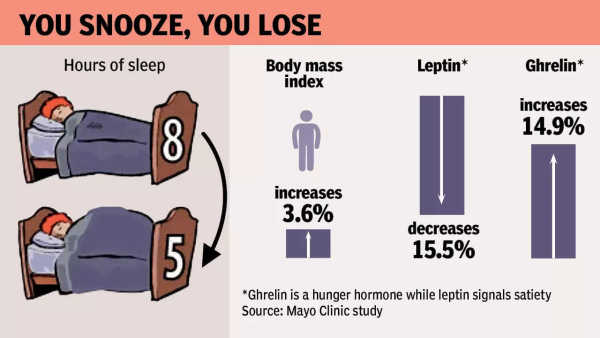
A recent national survey on sleep patterns found that 59% of Indians get less than six hours of sound sleep every day. But it’s not just a matter of getting enough rest. Sleeping late and less than five hours a day can impact your health in various ways. Dr Dheeraj Kapoor, head of endocrinology at Kokilaben Dhirubhai Ambani Hospital, Mumbai, tells Lata Mishra why getting your daily dose of shuteye is important
How does poor sleep affect metabolism and blood sugar regulation?
Poor sleep quality and sleep deprivation are two critical factors that contribute to conditions like Type 2 diabetes, obesity, polycystic ovary syndrome (PCOS), and fatty liver disease. Sleep deprivation, defined as getting less than 7-8 hours of sleep, and disrupted sleep quality, where a person frequently wakes up at night, both increase the risk of metabolic disorders. When sleep is compromised, the body produces excess cortisol, a stress hormone that heightens insulin resistance and increases the risk of diabetes. Additionally, hormonal imbalances occur — ghrelin (the hunger hormone) rises while leptin (which signals fullness) decreases, leading to increased appetite and cravings for high-calorie foods. Sleep deprivation also triggers inflammation and oxidative stress, further contributing to metabolic dysfunction.
Can just one night of poor sleep impact us?
While chronic sleep deprivation has a more profound impact, some studies indicate that even one night of poor sleep can elevate cortisol levels which, in turn, increases insulin resistance and the risk of diabetes.
Why is sleeping less than five hours and going to bed late harmful?
This combination disrupts the body’s circadian rhythm, the internal 24-hour clock that regulates sleep, hormone secretion, and metabolic processes. When sleep duration is too short and occurs too late at night, cortisol production rises, insulin sensitivity decreases, and metabolic disorders become more likely. Night-shift workers and those who regularly stay up late are at higher risk of developing metabolic syndrome due to these disruptions.
If someone gets eight-plus hours of sleep but goes to bed late, are they still at risk for metabolic issues?
Yes. While getting adequate sleep is beneficial, the timing of sleep also matters. Sleeping after midnight disrupts the circadian rhythm which regulates physiological processes, including sleep, hormone secretion, and metabolism. It helps control insulin sensitivity and glucose metabolism. When disrupted — due to irregular sleep schedules, shift work, or sleeping late — metabolic processes get impaired, leading to increased risks of diabetes and obesity.
Do late sleepers tend to have poorer glucose control?
Their disrupted circadian rhythms affect insulin function and glucose metabolism. They also tend to have irregular eating patterns, increased cravings for high-calorie foods, and higher cortisol levels, all of which contribute to poor glucose control. Night-time eating habits further exacerbate insulin resistance, increasing the risk of metabolic disorders.
What about other disorders like PCOS, fatty liver disease, or high cholesterol? Are they caused by poor sleep too?
Yes. Poor sleep affects hormone balance, leading to increased insulin resistance and metabolic dysfunction, which play key roles in conditions like PCOS, fatty liver disease, and high cholesterol. Sleep deprivation also promotes weight gain and inflammation, both of which contribute to these metabolic disorders.
 Can exercise reduce the impact of sleep loss on insulin sensitivity?
Can exercise reduce the impact of sleep loss on insulin sensitivity?
Yes. Exercise, particularly high-intensity interval training (HIIT) and strength training, can help reduce some of the negative effects of sleep loss by improving insulin sensitivity and metabolic function. However, exercise should ideally be done in the morning, afternoon, or early evening rather than right before bedtime, as late-night workouts can increase adenosine levels and interfere with sleep quality. Also, reducing screen time before bed and avoiding caffeinated drinks can further support better sleep quality and metabolic health.
Why does caffeine consumption disrupt sleep more as we age?
Caffeine is a central nervous system stimulant that blocks adenosine, a chemical that promotes sleep. As individuals age, the body’s ability to metabolise caffeine slows down, making its effects last longer. Older adults are also more sensitive to sleep disturbances, meaning even a small amount of caffeine consumed in the evening can lead to prolonged wakefulness and fragmented sleep. Additionally, age-related changes in sleep patterns, such as lighter sleep and increased awakenings, make the effects of caffeine more pronounced. It is recommended that older adults reduce caffeine intake in the afternoon and evening to improve sleep quality.
What are some effective strategies for improving sleep hygiene?
Good sleep hygiene involves adopting healthy habits that promote restful sleep. Some effective strategies include:
Maintaining a consistent sleep schedule: Going to bed and waking up at the same time every day, even on weekends, helps regulate the body’s internal clock.
Creating a comfortable sleep environment: Keeping the bedroom dark, quiet, and cool can enhance sleep quality. Using blackout curtains, white noise machines, and comfortable bedding can help.
Avoiding stimulants before bedtime: Caffeine, nicotine, and heavy meals should be avoided in the evening to prevent sleep disturbances.
Engaging in relaxation techniques: Meditation, deep breathing exercises, or light stretching before bed can help relax the mind and body.
Getting regular physical activity: Exercising during the day promotes better sleep, but vigorous workouts should be avoided close to bedtime.

